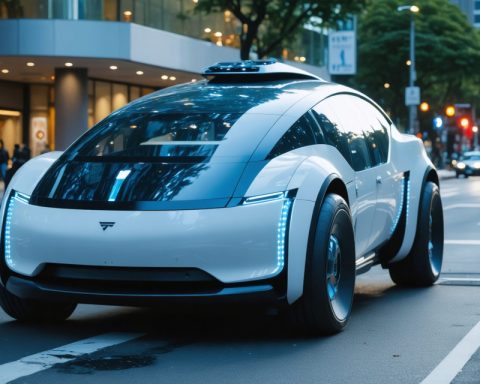Tesla’s Impact on the Future of Technology
Tesla is not just about electric vehicles anymore; it is rapidly becoming a powerhouse in technology with vast implications for the future. Investors are looking at Tesla’s stock as a viable option not only for its EV innovations but also for its ambitious projects in energy storage, artificial intelligence, and sustainable solutions.
With aspirations to enhance battery efficiency and create a self-sustaining energy ecosystem, Tesla aims to play a pivotal role in the global energy transition towards renewables. The company’s advancements in energy storage products, like the Powerwall, are crucial for harnessing solar and wind energy—sources that need stability to replace fossil fuels effectively.
In the realm of artificial intelligence, Tesla’s work on Full Self-Driving software is revolutionizing transportation. The potential of this technology extends beyond individual cars, promising a major overhaul of logistics and urban development. With self-driving vehicles, urban areas could be redesigned to favor green spaces instead of congested roadways, significantly improving urban livability.
Moreover, Tesla’s focus on intertwining AI with energy solutions can lead to job creation in various sectors, from engineering to production. As industries adapt to these innovations, economies may thrive on sustainable practices.
In summary, Tesla is carving out a future where technology, environment, and economic growth become interconnected, making its stock an exciting prospect for those who want to invest in the new frontier of global transformation.
The Broader Implications of Tesla’s Technological Revolution
As Tesla reshapes the landscape of technology, its broader impact reaches deep into societal, cultural, and economic realms. The company’s innovations in electric vehicles and renewable energy are not merely pragmatic advancements; they are catalysts for a seismic shift in how society conceptualizes energy consumption and transportation.
The societal transition to electric vehicles (EVs) can lead to a paradigm shift in urban infrastructure, reducing reliance on oil and, in turn, reshaping geopolitical power dynamics traditionally tied to fossil fuel reserves. Cities might evolve into greener, more pedestrian-friendly environments, giving rise to a culture that prioritizes sustainability over convenience.
On the economic front, the push towards a green economy may foster a new era of job opportunities. By investing in local renewable energy projects and manufacturing EV components domestically, countries can stimulate their economies while ensuring energy independence. This pivot could significantly reduce unemployment rates, particularly in sectors hit hard by automation and declining fossil fuel industries.
Environmental ramifications of Tesla’s momentum are substantial; accelerated battery production and increased reliance on renewable energy can slash carbon emissions dramatically if managed appropriately. However, the necessary extraction of lithium and other materials for batteries also poses sustainability challenges that must be addressed to realize Tesla’s vision fully.
Looking ahead, as Tesla navigates these complex waters, their success may signal a pivotal moment in history where technology converges with environmental responsibility, ushering in a more sustainable global economy that redefines our relationship with the planet and each other.
The Future of Technology: How Tesla is Shaping Our World
Tesla’s Impact on the Future of Technology
Tesla is rapidly evolving from an electric vehicle manufacturer into a technological titan with substantial potential across various sectors. Investors are paying close attention not only to Tesla’s advancements in electric vehicles but also to its groundbreaking ideas in energy storage, artificial intelligence, and sustainability.
Innovations Driving Change
Battery Efficiency and Renewable Energy Solutions
Tesla has set ambitious goals to improve battery efficiency significantly. The company’s innovations in energy storage products, especially the Powerwall and Powerpack, are crucial as they allow for the effective harnessing and storage of renewable energy from sources like solar and wind. This capability is fundamental for ensuring stability in energy supply, making it feasible to replace fossil fuels with renewables effectively.
Artificial Intelligence and Full Self-Driving Technology
Tesla’s pioneering work in artificial intelligence is not limited to enhancing vehicle performance. Their Full Self-Driving (FSD) software has the potential to revolutionize not just transportation but entire urban environments. As self-driving vehicles become mainstream, cities could be redesigned to prioritize green spaces and reduce reliance on traditional roadways, promoting a healthier lifestyle for urban dwellers.
Economic Impact and Job Creation
Tesla’s robust integration of AI and energy technologies promises to create a plethora of job opportunities in various fields such as engineering, software development, and production. As more industries adapt to these cutting-edge technologies, the economy could transition towards more sustainable practices, which are increasingly vital as global concern for environmental impacts grows.
Pros and Cons of Tesla’s Innovations
Pros:
– Sustainable Energy Focus: Tesla’s commitment to renewable energy contributes positively to environmental sustainability.
– Job Creation: New sectors emerging from Tesla’s innovations may lead to job growth and economic resilience.
– Urban Development: Potential for redesigning urban spaces that provide better quality of life through reduced traffic and increased green spaces.
Cons:
– High Initial Costs: Transitioning to electric and AI-driven technologies can be costly for individuals and companies.
– Regulatory Challenges: The implementation of self-driving technology faces hurdles from regulatory bodies that may slow down progress.
– Market Competition: Growing competition in the EV and energy space might affect Tesla’s market share and profitability.
Predictions for Tesla and the Market
Many analysts predict that Tesla will continue to be a leader in electric vehicles and energy solutions, with market strategies aimed at expanding its international presence. As the demand for sustainable energy and smart technologies increases, Tesla is well-positioned to lead this transition.
Conclusion
Tesla is not just influencing the automotive industry; it is reshaping the future where technology, sustainability, and economic growth are interlinked. The company’s innovation strategies could pave the way for a new era of development, making investment in Tesla an exciting prospect for those looking to engage with the forefront of global transformation.
For more insights on technology and innovation, visit Tesla’s official website.


















